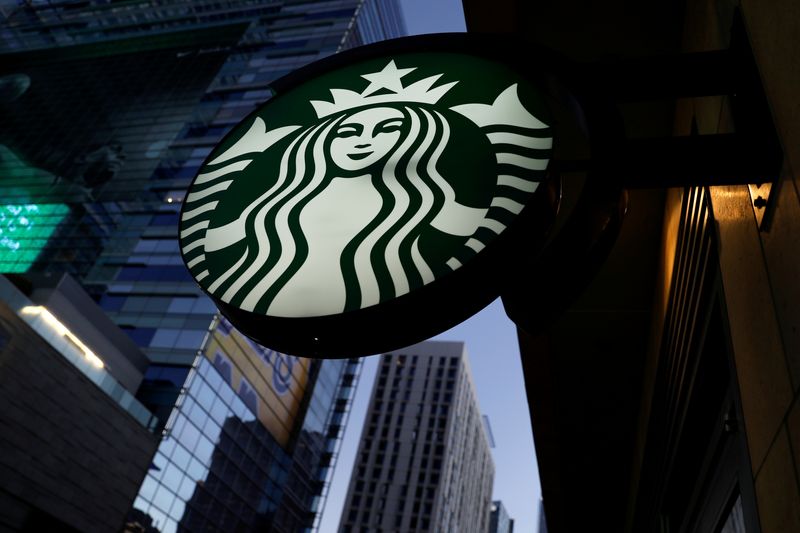By Deborah Mary Sophia and Hilary Russ
(Reuters) -Starbucks Corp beat Wall Street estimates for quarterly profit on Tuesday as higher prices and strong demand for its coffees in the United States helped offset a hit to business in China from renewed COVID-19 lockdowns.
Despite record inflation in the United States that ate in to Starbucks (NASDAQ:SBUX)' operating margin, the chain is "not currently seeing any measurable reduction in customer spending or any evidence of customers trading down," interim Chief Executive Officer Howard Schultz told investors on a conference call.
The Seattle-based chain earned 84 cents per share on an adjusted basis, beating estimates of 75 cents. The company's stock rose nearly 2% in extended trading.
However, global comparable sales rose 3% in the fiscal third quarter ended July 3, compared with analysts' average estimate for a 3.76% rise, according to Refinitiv IBES.
U.S. sales were boosted by Starbucks' ability to raise prices without pushback from its wealthier customers and its booming sales of cold beverages, which now make up about 75% of total beverage sales in U.S. company-operated cafes.
Its U.S. active membership in its rewards program also grew 13% to 27.4 million members.
Higher costs for ingredients and enhanced benefits for some U.S. employees affected operating margins, which fell by 400 basis points to 15.9%. Same-store sales grew 9% in North America.
As it fends off an organizing drive that has prompted workers at 200 stores to vote to unionize since last year, Schultz said in April that the company would boost benefits and wages - but only for workers in nonunionized stores - starting this week.
China was hit by the "most severe COVID disruption since the pandemic began," with comparable sales in the company's fastest-growing market slumping 44% in the quarter, Belinda Wong, chairman of Starbucks China, said during the call.

A fresh round of lockdowns in Shanghai and a resurgence of COVID-19 in Beijing and other Chinese cities had forced Starbucks stores to shut seating areas, allowing the company to offer only deliveries or mobile orders for most of the quarter.
Total net revenue rose to $8.15 billion from $7.5 billion a year earlier, edging past analysts' average estimate of $8.11 billion.